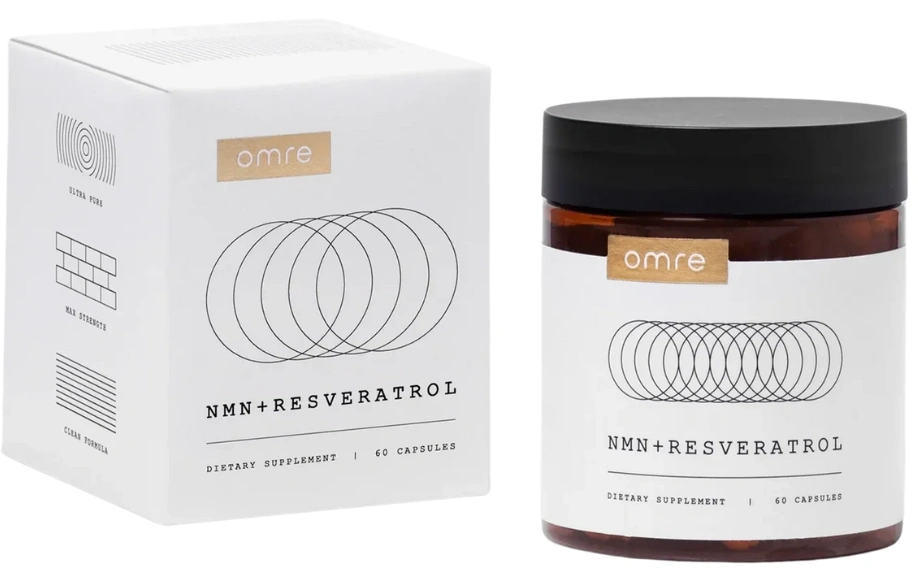Table of Contents
- Key Takeaways:
- Understanding NAD
- Why Supplement NAD?
- Why Direct NAD Supplementation Isn’t Ideal
- Potential Health Benefits of NMN Supplements
- What is Resveratrol?
- Potential Health Benefits of Resveratrol
- Why Combining NMN and Resveratrol Might Be a Game-changer
- Are There Any Side Effects?
- How to Choose the Best NMN + Resveratrol Supplement
- FAQs
- Conclusion
Curious if combining NAD and Resveratrol can help you stay sharp, energized, and healthy as you age?
This powerful pair is gaining attention for its potential to support longevity, boost cellular repair, and improve overall vitality. Here's what the science says.
NMN + Resveratrol
Cellular NAD+ booster with ultra‑pure NMN and Resveratrol, at research‑backed doses.*
Key Takeaways:
NMN and Resveratrol work better together. NMN raises NAD+ levels, while Resveratrol activates sirtuins that depend on NAD+, creating a strong combo for healthy aging.
Research shows real promise. Studies suggest NMN may improve insulin sensitivity, muscle function, and energy metabolism, especially in older adults.
Bioavailability matters. Look for supplements that include BioPerine® or fat-soluble delivery to help your body absorb these compounds more effectively.
Choose quality over hype. Stick to products with 98–99% purity, research-backed dosages (500 mg), and third-party testing for safety and effectiveness.
Understanding NAD
NAD, or Nicotinamide Adenine Dinucleotide, is a coenzyme found in every living cell. It’s like a helper molecule that fuels essential cellular processes, from energy production to DNA repair. Think of it as the body’s natural battery charger—keeping your cells functioning properly and ensuring they stay in good shape.
As a key player in metabolism, NAD helps convert nutrients into energy, powering everything from muscle movement to brain activity. It also supports the body’s ability to repair damaged DNA, which is vital for longevity and resilience against aging.
But there’s a catch: NAD levels naturally decline as we age. This drop can leave our cells struggling to maintain their efficiency, leading to slower metabolism, fatigue, and other signs of aging. That’s why there’s growing interest in finding ways to support and replenish NAD levels.
Why Supplement NAD?
 Adding NAD precursors to your routine might help support cellular health as you age. Here’s why:
Adding NAD precursors to your routine might help support cellular health as you age. Here’s why:
May enhance energy production: By helping cells convert nutrients into energy (1).
Might promote DNA repair: Supporting healthy aging and reducing cellular stress (2).
Could assist brain function: Helping cells communicate more effectively for better cognitive health (3).
May improve metabolic health: Supporting balanced blood sugar and fat metabolism (4).
Why Direct NAD Supplementation Isn’t Ideal
Direct NAD supplementation may not be the most effective way to support NAD levels in the body. Research suggests that NAD molecules are too large to pass through cell membranes efficiently, meaning they might not reach where they’re needed most (5).
Instead, scientists have identified alternatives like NAD precursors—compounds that your body can convert into NAD.
These precursors, such as Nicotinamide Riboside (NR) and Nicotinamide Mononucleotide (NMN), are smaller and more bioavailable, making them better options for boosting NAD levels.
Among these, NMN stands out as one of the most researched and promising NAD precursors. Studies have found NMN to be well-tolerated and effective in elevating NAD levels in both animal and human trials.
Potential Health Benefits of NMN Supplements
NMN supplements show promise in supporting a wide range of health benefits. However, while research is growing, more human studies are needed to fully understand their impact. That said, studies suggest NMN might:
Support healthy aging: Studies have found that NMN may promote cellular repair and reduce oxidative stress, which are key factors in supporting healthy aging (6).
Improve insulin sensitivity: Studies have found that NMN may help improve glucose metabolism and reduce the risk of type 2 diabetes in prediabetic women (7).
Enhance physical performance: Research suggests NMN might increase aerobic capacity and muscle strength, particularly in middle-aged and elderly individuals (8).
Promote liver health: Clinical trials show NMN may support better liver function in older adults (9).
Increase NAD levels: Studies highlight NMN’s ability to boost NAD levels dose-dependently, promoting cellular repair and energy production (10).
Animal studies have also suggested NMN may improve heart and brain health, though further human trials are needed to confirm these findings.
What is Resveratrol?
 Resveratrol is a natural compound found in foods like red wine, grapes, and berries. It’s a polyphenol—a type of plant compound known for its antioxidant and anti-inflammatory properties. Studies suggest Resveratrol may help protect cells from damage and support overall health.
Resveratrol is a natural compound found in foods like red wine, grapes, and berries. It’s a polyphenol—a type of plant compound known for its antioxidant and anti-inflammatory properties. Studies suggest Resveratrol may help protect cells from damage and support overall health.
In the body, Resveratrol works by activating sirtuins, a group of proteins linked to longevity and cellular repair. Interestingly, these proteins rely on NAD to function, which is why Resveratrol and NAD precursors like NMN make such a complementary pair.
Resveratrol’s potential benefits extend beyond longevity. Research shows it might support cardiovascular health by improving blood flow and cholesterol levels, protect the brain against age-related cognitive decline, and even help regulate blood sugar in people with metabolic concerns.
By supporting sirtuins and reducing oxidative stress, Resveratrol helps keep your cells functioning optimally, making it a valuable addition to any wellness routine.
NMN + Resveratrol
Cellular NAD+ booster with ultra‑pure NMN and Resveratrol, at research‑backed doses.*
Potential Health Benefits of Resveratrol
Resveratrol has been widely studied for its potential health benefits, but as with many supplements, more human research is needed to confirm its full range of effects. Early findings are promising, and here are some of the areas where Resveratrol might make a difference:
Heart health: Studies suggest Resveratrol may help reduce blood pressure, improve cholesterol levels, and promote better blood flow, potentially lowering the risk of heart disease and stroke (11).
Brain protection: Research indicates that Resveratrol might protect against cognitive decline, including conditions like Alzheimer’s and dementia, by reducing oxidative stress in the brain (12).
Metabolic support: Findings show that Resveratrol may help regulate blood sugar and improve insulin sensitivity, which could be beneficial for those at risk of type 2 diabetes (13).
Joint health: Studies have found that Resveratrol might ease joint pain and reduce inflammation, particularly in conditions like osteoarthritis and rheumatoid arthritis (14).
Longevity and aging: Animal studies suggest that Resveratrol’s antioxidant properties may support healthy aging and promote longevity by reducing cellular damage (15).
Why Combining NMN and Resveratrol Might Be a Game-changer
-v1750794971615.webp) Combining NMN and Resveratrol may offer a unique synergy that supports cellular health and longevity. While NMN increases NAD+ levels, Resveratrol indirectly increases NAD+ levels by activating sirtuins, proteins that upregulate cellular NAD+ production. Together, they might amplify each other’s benefits, creating a powerful foundation for healthy aging.
Combining NMN and Resveratrol may offer a unique synergy that supports cellular health and longevity. While NMN increases NAD+ levels, Resveratrol indirectly increases NAD+ levels by activating sirtuins, proteins that upregulate cellular NAD+ production. Together, they might amplify each other’s benefits, creating a powerful foundation for healthy aging.
This duo works by addressing two critical aspects of cellular health. NMN acts as a precursor to NAD+, supporting energy production and DNA repair. Resveratrol, on the other hand, optimizes the activity of sirtuins, which play a key role in managing cellular stress and aging.
Studies suggest that their combined use might enhance metabolic health, improve physical performance, and protect against age-related decline.
For instance, one study found that NMN supplementation improved insulin sensitivity and muscle function in older adults. Another showed that Resveratrol might increase sirtuin activity by up to 13 times, helping the body manage oxidative stress more effectively (16).
While more research is needed, these findings highlight the potential of this combination.
By working together, NMN and Resveratrol might create a ripple effect of benefits throughout the body, from supporting heart and brain health to promoting better energy metabolism and cellular repair.
Are There Any Side Effects?
Studies have found that NMN and Resveratrol are generally well-tolerated when taken at recommended dosages. However, higher doses may lead to mild side effects in some individuals, particularly if taken without proper guidance or in sensitive populations. (17, 18)
While the risk is low, it’s still worth knowing what to watch out for:
Digestive Issues: Nausea, stomach discomfort, or diarrhea.
Headaches: Some people may experience mild headaches, especially when first starting.
Allergic Reactions: Rarely, individuals with sensitivities to ingredients like Resveratrol might notice skin rash or itching.
Fatigue or Drowsiness: High doses of NMN or Resveratrol could occasionally cause tiredness.
For most people, sticking to research-backed dosages minimizes the likelihood of side effects. For instance, NMN dosages up to 500 mg and Resveratrol dosages of 500-1,000 mg per day are commonly used in studies with no significant adverse effects reported.
It’s always a good idea to consult with a healthcare professional before starting a new supplement, especially if you’re on medications, pregnant, or managing a chronic condition.
Listening to your body and starting with smaller doses can also help you determine what works best for you.
How to Choose the Best NMN + Resveratrol Supplement
When looking for an NMN + Resveratrol supplement, it’s important to focus on quality, dosage, and transparency. With so many products on the market, making the right choice can feel overwhelming. Start by considering what you need most from your supplement, whether it’s purity, bioavailability, or value for money.
Things to consider:
Purity: Look for supplements that guarantee high purity levels, such as 98% or above, to avoid fillers or low-quality ingredients.
Dosage: Choose products with research-backed doses of both NMN and Resveratrol for meaningful results.
Bioavailability: Opt for supplements with ingredients like BioPerine® to enhance absorption and effectiveness.
Certifications: Check for third-party testing and manufacturing in GMP-certified facilities to ensure safety and quality.
One product that ticks all these boxes is Omre NMN + Resveratrol. This supplement combines ultra-pure NMN (99% purity) with Resveratrol (98% purity) at research-backed doses of 500 mg each. It also includes BioPerine® to improve absorption, making it a standout choice for supporting cellular health.
Unlike many alternatives, Omre’s supplement contains no fillers or artificial additives. Every capsule delivers maximum potency, offering significant value compared to buying NMN and Resveratrol separately.
Whether you’re new to these supplements or looking to upgrade, Omre provides a reliable and impactful option.
FAQs
Can you take NMN and Resveratrol together?
Yes, and many people do. They complement each other; NMN helps raise NAD+ levels, while Resveratrol helps the body use that NAD+ more effectively through sirtuin activation.
What’s the best time to take NMN and Resveratrol?
Morning is usually best. Taking them early may support your body’s natural energy rhythms and cellular repair processes throughout the day. Try taking them with food that contains fat for better absorption.
Is Resveratrol effective without NAD?
Not as much. Resveratrol activates sirtuins, which need NAD+ to work properly. Without enough NAD+, the benefits of Resveratrol may be limited. That’s why it’s often paired with NMN or NR.
How long does NMN take to raise NAD levels?
Studies show NMN can raise NAD+ levels in the body within hours, but most people notice benefits after a few weeks of consistent use. For lasting effects, daily use over time works best.
Can you take NMN and Resveratrol long term?
Most studies suggest that regular use over time is safe for healthy adults, especially at standard dosages. Still, it’s smart to take breaks now and then, and check in with your doctor if you’re on medications or managing health conditions.
Do you need a prescription for NMN or Resveratrol?
No prescription needed. These are sold as dietary supplements and are available over the counter. Just make sure to choose a reputable brand with clean ingredients and third-party testing.
Conclusion
NMN and Resveratrol are two exciting compounds that have captured the attention of researchers for their potential to support healthy aging.
While NMN works to increase NAD+ levels, Resveratrol enhances the body’s ability to use NAD+ effectively through sirtuin activation. Together, they may help improve cellular repair, energy production, and overall well-being.
If you’re considering adding these supplements to your routine, Omre NMN + Resveratrol is a top choice, offering purity, bioavailability, and clinically supported doses.  Interested in trying it? Check availability today and take the next step toward supporting your long-term health.
Interested in trying it? Check availability today and take the next step toward supporting your long-term health.





